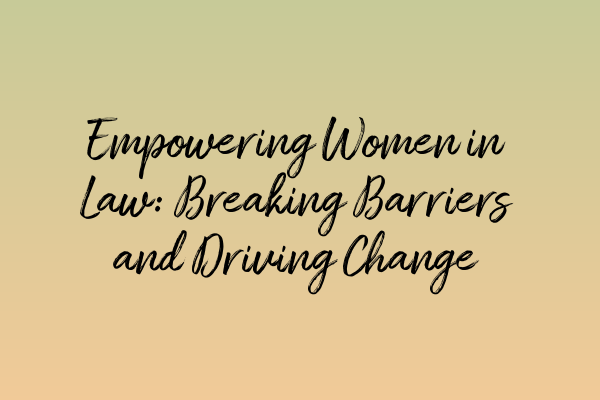Empowering Women in Law: Breaking Barriers and Driving Change
Introduction
In recent years, we have seen significant progress in the legal profession, with more women entering and thriving in the field of law. However, there is still work to be done to ensure gender equality and empower women in the legal industry. In this blog post, we will explore the barriers faced by women in law and discuss the initiatives and strategies aimed at driving change. We will also highlight the importance of diversity and inclusion in the legal sector and how it benefits not only women but the profession as a whole.
Breaking Barriers: Challenges Faced by Women in Law
Historically, the legal profession has been dominated by men, making it difficult for women to break through the glass ceiling. Women have faced numerous challenges, such as gender bias, limited access to opportunities, pay disparities, and work-life balance issues. These barriers have hindered their professional growth and advancement in the legal field.
However, women have been resilient in the face of adversity, challenging societal norms and stereotypes. They have proven their competence and aptitude, paving the way for future generations of female lawyers to succeed. Organizations and legal bodies have recognized the need for change and have implemented initiatives to support and empower women in law.
Driving Change: Initiatives and Strategies
Various initiatives have been introduced to foster gender equality and empower women in the legal profession. These initiatives aim to create a level playing field for women, enabling them to thrive and reach their full potential. Some of the key measures include:
1. Mentorship and Sponsorship Programs: Mentorship programs provide guidance and support to women in law by pairing them with experienced professionals who can offer advice and help navigate their careers. Sponsorship programs go a step further, actively advocating for the advancement of women and providing opportunities for growth and visibility.
2. Flexible Work Arrangements: Recognizing the challenges faced by women in balancing their personal and professional lives, many law firms and organizations have implemented flexible work arrangements. These arrangements allow women to manage their work commitments while still catering to their familial responsibilities.
3. Leadership Development Programs: Leadership development programs provide women with the necessary skills and knowledge to take on leadership roles within the legal profession. These programs help women develop their leadership abilities, enhance their confidence, and provide them with the tools to successfully navigate the challenges of being a leader in law.
4. Networking and Support Groups: Networking and support groups play a crucial role in empowering women in law. These platforms provide opportunities for women to connect, share experiences, and offer support to one another. They facilitate collaboration and mentorship, fostering a sense of community and empowerment.
Importance of Diversity and Inclusion
Promoting diversity and inclusion in the legal profession is not only essential for achieving gender equality but also for enhancing the overall performance and effectiveness of the profession. Research has consistently shown that diverse teams bring a wider range of perspectives, experiences, and skills, leading to better decision-making and problem-solving.
By embracing diversity and inclusion, law firms and organizations can attract and retain top talent, improve client relationships, and effectively serve a diverse client base. It creates a culture of innovation, fosters creativity, and ensures that the legal profession remains relevant and responsive to the needs of society.
Conclusion
Empowering women in law is a critical step towards achieving gender equality and creating a more inclusive legal profession. By breaking down barriers, implementing initiatives, and promoting diversity and inclusion, we can create a future where women have equal opportunities to succeed and thrive in the legal industry. It is important for all stakeholders, including individuals, law firms, organizations, and legal bodies, to work together to drive change and create a more equitable and inclusive legal profession.
Related Articles:
– Private Prosecutions: Exploring Non-Governmental Prosecutions in Criminal Cases
– Understanding Drug-related Offences: Laws and Penalties in the UK
– Demystifying Criminal Law Procedures: A Step-by-Step Guide
– Rights of the Accused: Protecting Individual Liberties in Criminal Proceedings
– Magistrates’ Court vs Crown Court: Understanding Key Differences


Leave a Reply